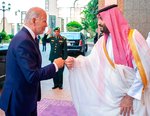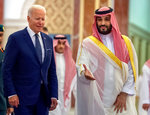

JEDDAH, Saudi Arabia (AP) — A crucial meeting to repair one of the world's most important diplomatic relationships began with a fist bump Friday as Saudi Crown Prince Mohammed bin Salman welcomed U.S. President Joe Biden at a royal palace.
The first encounter, captured by Saudi television, occurred as Biden stepped out of his presidential limousine in Jeddah for a visit that is intended to reset their countries' longstanding partnership.
There was little evidence of any warmth between the leaders, and none of the backslapping or smiles that Biden or the crown prince usually display when greeting other leaders.
Biden had long refused to speak to Prince Mohammed, the presumed heir to the throne currently held by his father, King Salman. And he harshly criticized the oil-rich kingdom for its human rights abuses, particularly the murder of Jamal Khashoggi, a U.S.-based journalist.
But those concerns have since been eclipsed by other challenges, including rising gas prices and Iranian aggression in the Middle East. At the same time, Saudi Arabia is looking to bolster its security relationship with the United States and seeking investments to transform its economy into one that’s less reliant on pumping oil.
The Saudis held a subdued welcome for Biden at the airport in Jeddah, with none of the ceremony that accompanied his stop this week in Israel.
Biden was greeted by Mecca’s governor, Prince Khalid bin Faisal, and Saudi Arabia’s ambassador to the U.S., Princess Reema bint Bandar, and then walked down a lavender carpet that led to the limousine that whisked him to the palace.
The president sat down with King Salman, the 86-year-old monarch who has suffered from poor health, including two hospitalizations this year. Journalists were not allowed into the room, but the Saudis released video of Biden shaking hands with the king while the crown prince looked on.
Afterward, Biden and Prince Mohammed held a broader meeting with several advisers. The two men sat across from each other, an arrangement that burnished the perception that they are counterparts. It’s an image that the crown prince, known by his initials MBS, has been eager to foster as he solidifies his path to the throne after sidelining, detaining, and seizing the assets of royal rivals and critics.
So far, his rise to power has ushered in a new era for the kingdom as it works to build a homegrown military and weapons industry, wean itself from reliance on oil for revenue and build security relationships to defend against Iran.
Now the future of the region, including the possibility of closer ties between Saudi Arabia and Israel, as well as the ebb and flow of the world’s oil supply could depend on the relationship between the 79-year-old U.S. president and the 36-year-old Saudi royal.
There had been considerable speculation about both the choreography and the substance of how Biden, who had vowed as a presidential candidate to treat Saudi Arabia as a “pariah” for their human rights record, would go about interacting with Prince Mohammed.
Access for journalists was limited. The White House traveling press corps was not present when Biden fist bumped the crown prince, and reporters were only briefly allowed into their meeting. Almost none of their remarks could be heard. Biden did not answer when reporters asked if he still considered Saudi Arabia a “pariah,” nor did Prince Mohammed respond to a shouted question about whether he would apologize to Khashoggi's family.
Last year Biden's administration approved the release of a U.S. intelligence finding that determined the crown prince likely approved Khashoggi's killing. The release of the report caused a rupture in U.S.-Saudi relations.
Before arriving in Saudi Arabia, Biden would not say if he would raise the issue directly with Prince Mohammed, and he did not do so within earshot of reporters on Friday.
The Saudis took a step toward normalization of relations with Israel before Biden's visit, announcing early Friday that it was opening its airspace to “all air carriers,” signaling the end of its strict limits on Israeli flights flying over its territory.
Biden hailed the decision as “an important step towards building a more integrated and stable Middle East region,” adding that the decision "can help build momentum toward Israel’s further integration into the region, including with Saudi Arabia.”
The Saudi visit is one of the most delicate that Biden has faced on the international stage. Any kind of respectful greeting that Biden can manage, and the Saudi crown prince can reflect back, might help both sides soothe relations.
But it could also open Biden, already floundering in the polls at home, to deeper criticism that he is backtracking on his pledges to put human rights at the center of foreign policy.
Khashoggi's fiancee, Hatice Cengiz, said that, with the visit to Saudi Arabia, Biden was backing down on human rights.
"It’s a very huge backing down actually,” Cengiz told The Associated Press in an interview Thursday. “It’s heartbreaking and disappointing. And Biden will lose his moral authority by putting oil and expediency over principles and values.”
Saudi political analyst Turki al Hamad said he was not optimistic about the prospects for Biden's trip.
“Biden and his team will come and set their eyes on the U.S. elections, and improving the Democrats’ situation by coming out with an agreement on increasing oil production,” Hamad tweeted, saying that “does not matter to the Saudi leadership.”
Aaron David Miller, a senior fellow at the Carnegie Endowment for International Peace and former U.S. State Department official, said Biden is looking forward to visiting Saudi Arabia “like I would look forward to a root canal operation.”
Miller contrasted Biden with his predecessor, President Donald Trump, who visited Saudi Arabia on his first foreign trip. That trip was highlighted by a mystifying photo op of the leaders gathered around a glowing orb and Trump briefly joining a ceremonial sword dance.
With Biden and Prince Mohammed, “there aren’t going to be a lot of sword dances, or smiling photo ops, or warm embraces,” Miller said.